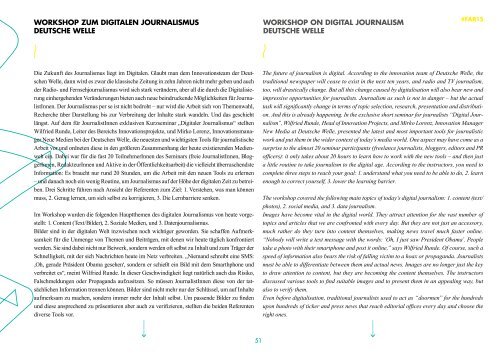DIGITAL IST KULTUR CULTURE IS DIGITAL – DIGITAL IS CULTURE
1n3RpM7
1n3RpM7
Sie wollen auch ein ePaper? Erhöhen Sie die Reichweite Ihrer Titel.
YUMPU macht aus Druck-PDFs automatisch weboptimierte ePaper, die Google liebt.
WORKSHOP ZUM <strong>DIGITAL</strong>EN JOURNAL<strong>IS</strong>MUS<br />
DEUTSCHE WELLE<br />
WORKSHOP ON <strong>DIGITAL</strong> JOURNAL<strong>IS</strong>M<br />
DEUTSCHE WELLE<br />
Die Zukunft des Journalismus liegt im Digitalen. Glaubt man dem Innovationsteam der Deutschen<br />
Welle, dann wird es zwar die klassische Zeitung in zehn Jahren nicht mehr geben und auch<br />
der Radio- und Fernsehjournalismus wird sich stark verändern, aber all die durch die Digitalisierung<br />
einhergehenden Veränderungen bieten auch neue beindruckende Möglichkeiten für JournalistInnen.<br />
Der Journalismus per se ist nicht bedroht <strong>–</strong> nur wird die Arbeit sich von Themenwahl,<br />
Recherche über Darstellung bis zur Verbreitung der Inhalte stark wandeln. Und das geschieht<br />
längst. Auf dem für JournalistInnen exklusiven Kurzseminar „Digitaler Journalismus“ stellten<br />
Wilfried Runde, Leiter des Bereichs Innovationsprojekte, und Mirko Lorenz, Innovationsmanager<br />
Neue Medien bei der Deutschen Welle, die neuesten und wichtigsten Tools für journalistische<br />
Arbeit vor und ordneten diese in den größeren Zusammenhang der heute existierenden Medienwelt<br />
ein. Dabei war für die fast 20 TeilnehmerInnen des Seminars (freie JournalistInnen, BloggerInnen,<br />
RedakteurInnen und Aktive in der Öffentlichkeitsarbeit) die vielleicht überraschendste<br />
Information: Es braucht nur rund 20 Stunden, um die Arbeit mit den neuen Tools zu erlernen<br />
<strong>–</strong> und danach noch ein wenig Routine, um Journalismus auf der Höhe der digitalen Zeit zu betreiben.<br />
Drei Schritte führen nach Ansicht der Referenten zum Ziel: 1. Verstehen, was man können<br />
muss, 2. Genug lernen, um sich selbst zu korrigieren, 3. Die Lernbarriere senken.<br />
Im Workshop wurden die folgenden Hauptthemen des digitalen Journalismus von heute vorgestellt:<br />
1. Content (Text/Bilder), 2. Soziale Medien, und 3. Datenjournalismus.<br />
Bilder sind in der digitalen Welt inzwischen noch wichtiger geworden. Sie schaffen Aufmerksamkeit<br />
für die Unmenge von Themen und Beiträgen, mit denen wir heute täglich konfrontiert<br />
werden. Sie sind dabei nicht nur Beiwerk, sondern werden oft selbst zu Inhalt und zum Träger der<br />
Schnelligkeit, mit der sich Nachrichten heute im Netz verbreiten. „Niemand schreibt eine SMS:<br />
‚Oh, gerade Präsident Obama gesehen‘, sondern er schießt ein Bild mit dem Smarthphone und<br />
verbreitet es“, meint Wilfried Runde. In dieser Geschwindigkeit liegt natürlich auch das Risiko,<br />
Falschmeldungen oder Propaganda aufzusitzen. So müssen JournalistInnen diese von der tatsächlichen<br />
Information trennen können. Bilder sind nicht mehr nur der Schlüssel, um auf Inhalte<br />
aufmerksam zu machen, sondern immer mehr der Inhalt selbst. Um passende Bilder zu finden<br />
und diese ansprechend zu präsentieren aber auch zu verifizieren, stellten die beiden Referenten<br />
diverse Tools vor.<br />
The future of journalism is digital. According to the innovation team of Deutsche Welle, the<br />
traditional newspaper will cease to exist in the next ten years, and radio and TV journalism,<br />
too, will drastically change. But all this change caused by digitalisation will also bear new and<br />
impressive opportunities for journalists. Journalism as such is not in danger <strong>–</strong> but the actual<br />
task will significantly change in terms of topic selection, research, presentation and distribution.<br />
And this is already happening. In the exclusive short seminar for journalists “Digital Journalism”,<br />
Wilfried Runde, Head of Innovation Projects, and Mirko Lorenz, Innovation Manager<br />
New Media at Deutsche Welle, presented the latest and most important tools for journalistic<br />
work and put them in the wider context of today’s media world. One aspect may have come as a<br />
surprise to the almost 20 seminar participants (freelance journalists, bloggers, editors and PR<br />
officers): it only takes about 20 hours to learn how to work with the new tools <strong>–</strong> and then just<br />
a little routine to take journalism to the digital age. According to the instructors, you need to<br />
complete three steps to reach your goal: 1. understand what you need to be able to do, 2. learn<br />
enough to correct yourself, 3. lower the learning barrier.<br />
The workshop covered the following main topics of today’s digital journalism: 1. content (text/<br />
photos), 2. social media, and 3. data journalism.<br />
Images have become vital in the digital world. They attract attention for the vast number of<br />
topics and articles that we are confronted with every day. But they are not just an accessory,<br />
much rather do they turn into content themselves, making news travel much faster online.<br />
“Nobody will write a text message with the words: ‘Oh, I just saw President Obama’. People<br />
take a photo with their smartphone and post it online,” says Wilfried Runde. Of course, such a<br />
speed of information also bears the risk of falling victim to a hoax or propaganda. Journalists<br />
must be able to differentiate between them and actual news. Images are no longer just the key<br />
to draw attention to content, but they are becoming the content themselves. The instructors<br />
discussed various tools to find suitable images and to present them in an appealing way, but<br />
also to verify them.<br />
Even before digitalisation, traditional journalists used to act as “doormen” for the hundreds<br />
upon hundreds of ticker and press news that reach editorial offices every day and choose the<br />
right ones.<br />
51


